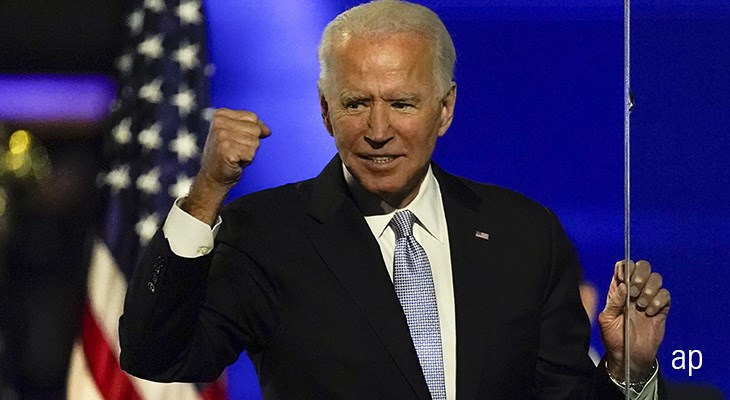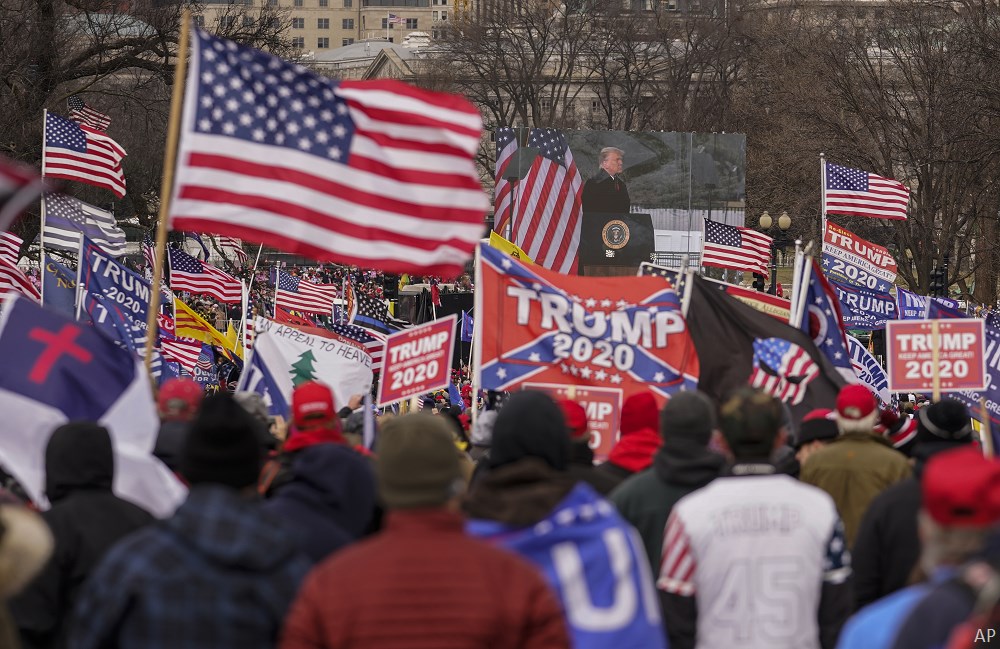
Any meaningful impact that the incoming Biden administration can have on the private sector will likely take some time.
We expect the first 12 to 18 months of Democrat Joe Biden’s term will be largely spent undoing the Republican Trump administration’s rules—with minimal impact on company valuations.
We think the biggest effect a Democrat-controlled Congress would have on investments is a likely increase in the corporate business tax rate. We also think Democrats will work to provide more stimulus and expand healthcare coverage, primarily within the Affordable Care Act framework. The narrow Democratic majority in the US Senate will help Biden make government appointments faster. But without a larger majority in Congress, a lot of public policymaking will be left up to executive action.
Here’s a look at what levers Biden can pull to enact his agenda and why we think most executive actions won’t have major impacts on most companies’ valuations (with few exceptions).
Tools the President can use to shape public policy
If Congress doesn’t pass new legislation or update existing laws, the president still has a variety of ways to shape domestic public policy. (We’ll cover trade and international relations in a later article.)
1) Rule-making and regulation. The president can set his policy agenda by directing agencies to issue new rules. While rule-making is the most powerful tool, it’s also among the slowest. Most major rule-makings take 18 months to two years to complete. Plus, the results are often uncertain due to inevitable litigation. Agencies typically have broad authority, but Congress can be highly specific about what it wants and leave agencies with little room to set policy. The Biden administration will also freeze rules that haven’t been finalised or aren’t yet effective. To make an immediate impact, under the Biden administration, federal agencies will likely begin by issuing “sub-regulatory guidance.” Such guidance doesn’t carry force of law but can be issued quickly and can signal regulated communities about agency views and priorities. Democrats also can expedite the undoing of Trump-era rules via the Congressional Review Act, but they’ve been hesitant to take this approach in recent years. Here’s how it works: For regulations finalised within 60 legislative days (which stretches back to late May), Congress can override the rule. This tool is not subject to a filibuster, so it can be done with 51 votes. But there’s a catch: Taking this route bars agencies from making a substantially similar rule. Due to the risk of binding agencies, Democrats have historically been reluctant to use this tool, but they may use it in some cases this year.
2) Enforcement. Democratic administrations have historically been much more aggressive in enforcing regulations, particularly with regard to those protecting the environment. Ramping up enforcement can be much faster than making new rules, but it still takes time to develop enforcement targets. The threat of enforcement often leads companies to adjust behavior before agency action. Enforcement also allows agencies to reinterpret rules. In fact, a common complaint from regulated industries is that agencies engage in “regulation by enforcement.” However, much enforcement of existing rules and laws in the US is already completed through private lawsuits.
3) Using nonappropriated or flexible funds. The executive branch can’t raise taxes on its own, but it can increase fees and then decide how to spend that money. Fee increases generally require rule-making, but how these dollars get spent is often reasonably unconstrained. Nonappropriated funds (meaning money that agencies raise but Congress does not directly control) are typically a small percentage of agency budgets, except for prudential regulators, which regulate banks. (The SEC relies on a user fee, but this fee is an appropriation for arcane reasons.)
4) Antitrust litigation. The Federal Trade Commission and Justice Department can try to break up certain companies if they can convince the judiciary that doing so would help to maintain a competitive marketplace. Over the past 40 years, antitrust litigation has largely focused on consumer welfare. However, we don’t believe that the shift in administrations represents an inflection point for antitrust policy. The federal government and almost every state have already filed various antitrust cases against big tech firms.
5) Other tools: Many laws allow federal agencies to issue waivers, grant permits, provide grants with appropriated funds, or approve loans or loan guarantees. Taken in combination, the government can use these smaller, less-forceful tools to leverage larger changes that can affect businesses.

Now that we have covered the tools of government, we will turn to how a Biden administration might use them to shape public policy and the effect on key regulated companies in healthcare, energy and manufacturing, financial services, and technology sectors. In most cases, we don’t think these tools will materially change most companies’ prospects or our valuations.
![]()
Healthcare: without Congressional action, Biden’s administration will likely expand coverage at the margins with little structural change
When it comes to healthcare, the ball is very much in Congress’ court. Although Biden endorsed a public option while running for president, we think Congress will primarily try to expand coverage through the existing ACA framework by enhancing Medicaid to include people further from the poverty line in all states and increase the subsidy in the individual marketplaces to reduce the costs for lower-income households. Such an expansion could cost between $85 billion to $105 billion annually. Either approach would rely on the existing private insurance system, and we don’t believe it would dramatically affect valuations for most firms we cover.
With or without Congress, we think the new administration will draft new rules on short-term health plans, raise nonappropriated funds to restore advertising and other support for federally run exchanges (although Congress would include new appropriations in any legislation), and use waivers to expand eligibility for coverage, such as in the Medicaid program. The redirection of funds and waivers could happen within 2021, while we expect the new rules to become effective in early 2022.
Most of these executive actions will simply undo steps the Trump administration took, and we do not expect them to change valuations for major healthcare players.

Energy, emissions, and environmental regulations: a slow, uncertain return to Obama-era rules with a sharper shift on permitting and enforcement
The Trump administration finalised hundreds of environmental rules that have affected energy companies over the past four years. It could take years for the Biden administration to reverse them and set a different course; however, many major rule shifts under the Trump administration have come too late to have a major effect. We continue to believe the kinds of extreme policy shifts that would make currently undervalued oil and gas stocks overpriced are not possible unless Congress changes current law. Automakers should be well-positioned to thrive, as the new fuel standards just recently went into effect and they have planned for a lower carbon-emission economy and therefore the likely abrupt reversal of these more-accommodating standards.
Rule-making on corporate average fuel economy, clean power, and greenhouse gases
As was the case for Trump’s deregulatory push, we expect the Biden administration will need time to restore the Obama-era regulatory approach aimed at reducing greenhouse-gas emissions under current law. In the meantime, the private sector has largely embraced moving to a lower-carbon economy. For example, by grounding their economic analysis in cost and safety, the Trump administration was able to reduce fuel economy requirements in the Corporate Average Fuel Economy, or CAFE, standards. Changes to these standards—as with other rule-makings—generally take time. Although the Trump administration used a built-in review process to adjust the CAFE standards, the need for a new regulatory impact analysis meant the project took more than two years. The Biden administration will probably spend a similar amount of time preparing justification to adjust the average corporate fuel efficiency standards to 47 miles per gallon or higher, grounding their rationale in costs of carbon-related externalities. However, the Trump-era rules, which apply to car model years 2021-26, were only finalised in June 2020. The Biden administration would likely set rules starting in 2026 for the 2027 model year. For their part, automakers are already planning for a lower-emission world, have been operating under the Obama-era rules for some time, and know revised standards of restoring or expanding them are likely. In terms of fossil-fuel use, the new standards would lift fuel efficiency compared with our base case in the first few years, but by 2030 we would not expect a meaningful difference. Any reduction in short-run fossil-fuel consumption would be modest and unlikely to affect our midcycle commodity price estimates, fair value estimates, and moat ratings for energy stocks.
Similarly, EPA finalised new rules on methane emissions in August of this year for the oil and gas industry, rolling back Obama-era controls on methane, a major contributor to climate change. As with other complex rule-making, these rollbacks took more than two years to develop and finalise. While the government’s regulatory impact analysis suggests modest overall savings for the industry, in the range of $17 to $19 million annually, we do not believe reversing the rule will result in similar reductions in profits for regulated companies. To comply with the methane reductions, utilities will need to invest in their equipment, and these capital expenditures can drive earnings growth for regulated utilities. Large fossil-fuel companies with big natural gas portfolios have also been highly supportive of tighter regulations because they help position natural gas as cleaner alternative fuel.
Likewise, when the Trump administration replaced the 2015 Clean Power Plan with new, more-permissive rules allowing higher emissions largely from coal-fired power plants (an action they completed in June 2019), it did not result in us changing our fair value estimates, moat ratings, or moat trend ratings. Simply put, renewable energy and natural gas have been displacing the coal generation for years because it is cheaper. The Biden administration will stop defending the new, more lax standards in court, and ongoing litigation may result in courts vacating the new rules and restoring the 2015 Clean Power Plan without new rule-making.
Finally, we expect some additional regulation of chemicals, such as Per- and polyfluoroalkyl substances. These regulations could cost the industry as much as $40 billion, including $11 billion in cleanup. Regarding PFAS chemicals, Congress recently attached reporting requirements for PFAS for manufacturers and water systems. Using existing authority under the Clean Water Act, the EPA will likely codify a recommendation to keep PFAS to 70 parts per trillion over the next few years. Given the reporting requirements, bipartisan consensus that PFAS should be regulated, and the existing regulation at the state level, industry has been anticipating this regulatory change for some time, and we believe the market has overestimated the impact on DuPont and Corteva.

Technology firms are squarely in antitrust crosshairs, and a bipartisan consensus on privacy creates some risk from new legislation
Unlike other sectors, tech firms such as Facebook and Google face threats from antitrust litigation in which the federal government has broad authority. However, we do not view Biden’s election as an inflection point in this litigation. Indeed, both Facebook and Google face current antitrust suits launched by the states and the federal government. They also face risks, albeit with much higher uncertainty, from Congress taking up new privacy standards. Furthermore, we continue to believe that even aggressive enforcement of antitrust laws will likely not strip Facebook or Google of their network effects or other competitive advantages. Should regulators seek to break up Facebook or Google, we believe shareholders may benefit, as both companies are worth the sum of their parts and spin-offs would retain high values.
Congress will consider establishing a new agency with broad authority to regulate online privacy
In a 2019 report, the US Government Accountability Office told a House committee that “Congress should consider developing comprehensive legislation on Internet privacy” that would bolster consumer protections and be flexible to the ever-changing nature of the Internet. Such legislation, the GAO said, could include delegating rule-making authority to an existing agency or creating a new one. The recommendation from the GAO, Congress’s in-house think tank, clarifies that there’s little that can be done to address Internet privacy under current law, so congressional action is required. Were this a strictly partisan issue, we might be waiting for some time for such action, but it’s not. The top Republican on the Senate Committee with jurisdiction has proposed bills broadly aligned with Democratic priorities on individual privacy rights and transparency. Ultimately, we expect if legislation were to pass, it would likely reduce revenue opportunities for some tech companies, while strengthening their economic moats by making it more difficult for new entrants to comply with regulations or put together a business plan with a path to profitability. Because Congress has little in-house expertise on technology, lawmakers will have to rely on outside experts and those who they’re trying to regulate to craft workable legislation. This means that any changes will be fairly accommodating to corporate interests. The recent violent riots and disruption to the certification of the 2020 election at the Capitol will have a minimal impact on the regulation of major social media firms, and do not change our assessment that bipartisan consensus is more likely for privacy concerns than for new antitrust tools or redefining firm liability for user-generated content.
While the federal government may pursue further antitrust litigation, major players do not face existential threats
Most existing antitrust tools aren’t sufficient to upend the business models of big tech companies and Congress is unlikely to expand existing antitrust laws. As detailed in previous reports on Morningstar Direct, antitrust laws may be used to restrict mergers and acquisitions but demonstrating broad consumer harm from current technology monopolies will be challenging to impossible. We previously estimated that in the worst-case scenarios, fair value estimates could fall in the 10- to 15-percent range for Facebook and Alphabet, a far cry from wholesale restructuring of their businesses.
Specifically, regarding Facebook, which faces litigation from 47 states and the FTC, we expect that the courts will side with the plaintiffs by restricting future market acquisitions such as those for WhatsApp and Instagram. As detailed in a recent analyst’s note, we do not expect the courts to force Facebook to spin these entities off, as it would be hard to prove that their control by Facebook hurts consumer welfare. If courts did so, we estimate shareholders would benefit in the short term, as our fair market valuation for Facebook, Instagram, and WhatsApp is $363 per share, higher than our current fair market estimate of $306 per share.
With Google, we are skeptical for similar reasons of a forced breakup, and we believe the sum of Google’s parts is at least as valuable as the company. Google may have to pay fines to settle the case the DOJ and 35 states have brought alleging that Google’s search results reduce competition as well practices that continue to lock in Google search as a default on various devices. Google also faces suits targeting its advertising business, although we are more skeptical of these given the declines in ad prices and increases in competition. Based on the consumer welfare standard that has guided jurisprudence on antitrust cases for four decades, we do not believe the plaintiffs will prevail in forcing a breakup, and we are maintaining our fair value estimate of $1,980.
Joshua Aguilar, Preston Caldwell, Eric Compton, Seth Goldstein, Richard Hilgert, David Meats, Travis Miller, Ali Moghrabi, Travis Miller, David Sekera, Julia Utterback, David Whiston, and Michael Wong contributed to this report.












.png)












